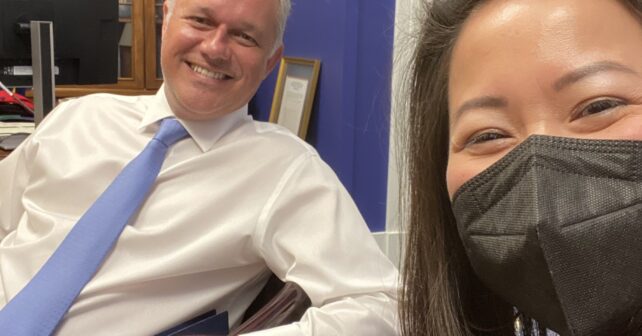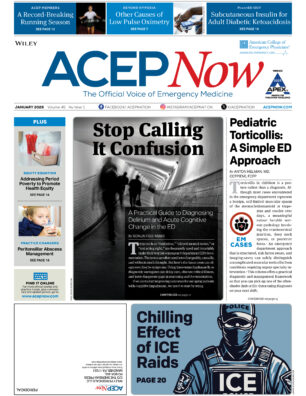
Last year’s scope of practice battle in Louisiana helped ignite my new passion for state-level advocacy work, and it can for you, too. In spring 2021, HB 495, a bill submitted by Rep. Barry Ivey, was progressing quickly through the Louisiana legislative process. It was a bill that would grant full practice authority to advanced practice registered nurses, who would no longer need to collaborate with a supervising physician when treating patients. As usual, I was watching from the sidelines—I’d always been passive with legislative advocacy efforts. This time, the bill passed through committee, something that had never happened before. Then the bill quickly progressed through the House floor. My stress level spiked at the realization this bill could become law, and I knew I couldn’t afford to wait this out and hope for the best—I had to get involved.
Explore This Issue
ACEP Now: Vol 41 – No 03 – March 2022By the time I joined the cause, things were looking pretty bleak. The consensus among the public was that the bill was going to pass, but Louisiana physicians from all specialties joined forces to push back against it. LA-ACEP worked together with other specialties to hire a short-term lobbyist to make a last-minute push. On the first day, the lobbyist actually was worried we hired him too late in the process, but he stayed the course and was at the capitol from dawn to dusk, spreading our message: Advanced practice nurses should not perform independent unsupervised care.1
Beginning a Grassroots Campaign
Using the power of social media, I started a physician-only Facebook group focusing specifically on this bill. While our lobbyist was at the capitol, we made a big grassroots push. We organized hundreds of physicians statewide to deluge our legislators by phone, via email, or in person. It was clear that a lot of physicians wanted to get involved and didn’t know how to go about it. We kept it simple to make their voices heard; our collective voice declared to our legislators that Louisiana physicians did not support this bill.
The next month was wild! We communicated ideas and directions among physicians, our contacts, and lobbyists at the capitol. I posted daily updates with next steps (provided by our contacts) on our Facebook group page. Within a few days, the momentum started to change in our favor, and we knew we couldn’t rest. We kept the messaging going for the next month. It was such an incredible feeling the day we found out the bill had officially been defeated.
Going through this experience on such an intimate level, I discovered my passion for state advocacy. At the end of the 2021 session, I decided I would start advocating in my spare time to support good health care legislation. After watching every single relevant House and Senate committee meeting, I realized our legislators are sometimes passing or not passing laws they don’t fully understand. Many state representatives are former lawyers and business owners, so they can’t possibly know every detail of every topic, including how their proposed policies affect patients. As a practicing emergency physician, I felt responsible to help educate them.
I enrolled in a master’s program for health law and administration at Loyola University New Orleans so I can learn as much about health care law and legal research as possible. Currently, I’m working on ketamine legislation with a trauma surgeon at the local trauma center, and our LA-ACEP leaders are planning to make some good state-level changes in the coming years, so we’re hoping to get as many Louisiana physicians involved as possible.
How You Can Get Involved, Too
If you’re thinking about getting involved in advocacy work for the first time, the hardest part is getting started. My advice? Just throw yourself in! After my first experience in Louisiana, I spent my 2021 summer taking every advocacy course I could (thanks to virtual education, taking courses is easier than ever). I had a great experience at ACEP’s Leadership & Advocacy Conference (acep.org/LAC), where we were trained on proper advocacy skills and met with various senators and representatives. Once I felt more confident, I reached out to my local legislators. I have already met with my state representative and met another one just by putting myself out there, and they were very welcoming. We met for coffee and talked about problems and solutions.
I believe emergency physicians are uniquely qualified as advocates because it’s what we do all day, every day. At the end of the day, we have not lost sight of the fact that we all went into medicine to help people. Get-ting involved with advocacy is another way we can help solve problems that affect our patients. As we learned in Louisiana, we can re-ally move the needle when we work together to help make a difference.
Get Involved Now!
Get plugged into ACEP’s advocacy efforts by joining the 911 Grassroots Network. Open to all ACEP members, it’s the only dedicated grassroots advocacy action network speaking on behalf of the specialty of emergency medicine and patients seeking emergency care acep.org/911grassrootsnetwork.
Dr. Kuo works full time at Veterans Affairs in New Orleans, Louisiana.
References
- Guidelines regarding the role of physician assistants and nurse practitioners in the emergency department. 2020 June. https://www.acep.org/globalassets/new-pdfs/policy-statements/guidelines-reg-the-role-of-physician-assistants-and-nurse-practitioners-in-the-ed.pdf
Pages: 1 2 3 | Multi-Page




4 Responses to ““If Not Me, Then Who?””
March 20, 2022
John CastleI’m a military trained PA. I’ve been a PA for over 40 years. I’ve worked many of those years in the ER, as well as surgery and other specialties. I don’t really see the problem. I do NOT want independent practice. I’m not a doc and over my career lifespan I’m convinced that I’m pretty good, but I’m not THAT good. I like the security of having a “boss” and asking the boss for advice. I’m secure in my role and therefore don’t feel endangered by having someone looking at my work. For heaaven’s sake, the docs ask each other what to consider in some cases. Why can’t I? Ever since I graduated from my RN course (prior to PA), I hear the nurses bad-mouthing the docs and the fact that the nurse isn’t allowed to “think.” Then go to medical school. I won’t earn more if I’m independent and that’s really the bottom line for my family. NPs, get a life!
September 16, 2022
JAMIE H KUOThank you so much for this.
March 20, 2022
Clayton Moore PharmD, PA-CI’m quite interested in this article and the underlying scope of practice concerns. I myself am a licensed PA. I recently returned to medical school due to my desire for autonomy as well as the additional training and skills acquired from residency.
The mental torture of completing the didactic portion of medical school after going through PA school can not be understated, however. This is NOT from the standpoint of struggling to excel through the basic sciences, but from the standpoint of the loss of income, loss of clinical experience, and the regression of real world clinical skills. This does not even take into account the fact that most NP’s/PA’s including myself are into there 30’s or later in life before they can begin to entertain the idea of medical school. Family and life circumstances are obviously different than the average medical school applicant.
I strongly agree not all, if any, NP’s or PA’s should be permitted independent practice in the emergency room setting. The minimum standard is just not high enough and it creates a dangerous precedent. At the same time is a newly graduated family practice trained physician more equipped than an APP with 30 years of experience? I have worked with numerous APP’s that I would prefer to care for my family over non-emergency boarded physician.
I say all of that to say we have to come up with a better solution to get APP’s trained for independent practice. I don’t believe an APP’s cumulative training should be shorter than a physicians. I don’t believe there should be any short circuiting of licensing exams, residency, or other quality control measures. I do know that life happens differently for everyone. Some of us have to take circuitous paths to reach our goals.
An abbreviated bridge program serves multiple purposes. This program would allow the most talented APP’s to obtain independence, it highlights the point that APP’s do not find themselves equal to physicians just by the nature of creating the program, and it would actually decrease the provider workforce size while these individuals are going through the program.
Thanks for reading my soapbox. I’m happy to discuss.
September 16, 2022
JAMIE H KUOI would love to connect and hear updates on your medical school journey.